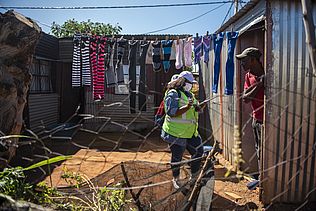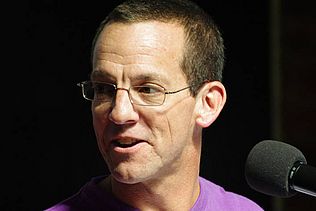This health campaign was already ready to start when the coronavirus began to spread on the planet: Nationwide, Community Health Workers (CHW) in South Africa planned protests against their dangerous working conditions.
For years, CHW have been caring for sick people and people at high risk of infection in violent poor districts. Thousands of Community Health Workers have already fallen ill themselves through their work or have been physically attacked during their service. Corona threatens to escalate these dangers: There are initial reports that CHW are being sent into communities without adequate preparation and protective clothing to track infected people and their contacts.
During apartheid, Community Health Workers (CHW) were part of the oppositional health work and referred to the concept of basic health care, which provided for the participation of the communities and those directly affected. People were supposed to formulate their health concerns themselves and work towards their implementation.
However, the goal of the first government under Nelson Mandela, democratically elected in 1994, to implement universal access to health care soon failed: on the one hand because of the rapidly growing AIDS crisis - but also because of a neoliberal turnaround after 1996, which led to the division of the health care system into a booming private sector and a loss-making public sector. As a result, most emancipatory health projects disappeared.
Community Health Workers compensate for state failure
In the wake of the AIDS crisis, which brought with it a huge additional burden on the health system, tens of thousands of community health workers were recruited as volunteers from the beginning of 2000 onwards to provide home care for the sick in the poor districts. In this way, the state health care system outsourced responsibility, AIDS patients became invisible to the public and community health workers became an integral part of the system, without whom the nationwide supply of antiretroviral drugs would not have been possible over the last 10 years.
However, CHW work as "volunteers" without labour rights, decent working conditions and adequate remuneration. CHW increasingly resisted this and began to fight for recognition and better conditions.
For more than six years, medico has been supporting this self-organization process of CHW through a network of nationwide health organizations such as section27, People's Health Movement, Khanya College, Sinani and others, who provide training and organizational support to CHW. In 2019 the first national summit meeting of 300 CHW representatives* from all 9 provinces took place.
And now Corona
The first documented case of corona in South Africa on 1 March was an upper class holidaymaker from Italy. Already on 28 March there were 1187 cases and it becomes clear: The virus has arrived in the country and is spreading fast, meanwhile also in Khayelitsha and other townships where the poor South Africans* live.
The well-equipped border between rich and poor, which separates the isolated villa districts from the poor settlements, is permeable for the virus in all directions, because there is no rich household that does not employ numerous domestic workers from the poor districts.
Once the virus has reached the huge townships and informal slums, where people live together in the smallest of spaces, it will spread rapidly.
The government has reacted quickly: since 27 March there has been a radical three-week curfew to slow down the spread and to control the outbreak in such a way that it does not overwhelm the country and the health system. An ambitious goal.
One of the greatest inequalities in the world
In a country with one of the greatest inequalities in the world, the curfew poses an immediate existential threat to millions of people who survive by working in the informal sector. Staying at home, keeping social distance and following hygiene measures is almost impossible for people who do not have running water and live together in tens or more in a confined space, even with the best will in the world.
Although people have so far shown great understanding for the government's measures, initial reports that the police and military have aggressively driven people back into their homes are worrying. In any case, South Africa has a very high rate of violence - not least domestic violence.
Hundreds of civil society organisations, including trade unions, informal workers' organisations, health movements and community structures have now launched an impressive appeal. They are calling on everyone to help stop the epidemic, reduce transmission and mitigate the social, economic and political consequences.
"Drastic measures must be taken if we are to avoid a catastrophe. Each of us must act now," the declaration says. The appeal also calls for income security (continued salary payments, including for domestic workers, state social assistance, deferral of loans) and access to water and soap. Private facilities and resources of services of general interest (such as health care, food production, but also the production of hygiene and health material) should be available to all people in order to ensure a uniform and fair distribution of resources and services.
Civil society involvement
Civil society movements must also be represented in the national crisis teams, the appeal goes on. While recognizing the important role of government in coordinating action and allocating resources, the signatories demand respect for the rule of law and human rights standards and call for a strong public movement from below. This movement should ensure that in an unequal society all protective measures are equally distributed.
In particular, those who are most vulnerable – because they are already starving, have a weakened immune system (7.7 million people in South Africa live with HIV and 300,000 have open tuberculosis) and poor access to health care - should be protected.
There are special demands with regard to the approximately 70,000 community health workers who are to play a central role in the education, mobilization and follow-up of corona infections.
They should be well trained and, like the health workers in the clinics, should be equipped with protective clothing. Even during the HIV crisis, CHWs were an essential bridge between the communities and the health system, enabling the widespread use of antiretroviral drugs and drastically reducing the AIDS mortality rate. However, the conditions under which CHW works - with temporary contracts for mini wages without social security and without protective clothing - are inhumane and exploit the great commitment and compassion of the almost exclusively female health workers*.
Everything is at stake for South Africa
Neither the government nor civil society organisations can manage the mammoth task of fighting the pandemic on their own. South Africa's health system, like the country itself, is extremely divided and unequal. In the private system, about 80% of the resources are used for about 15% of patients. The public system has 20% of the resources for 85% of the patients.
In another civil society call directly to the private health system and the private sector, it says: "We cannot allow the inequalities in our system to determine how we deal with the Covid 19 epidemic. We need the opening of the private health system. We need hospital beds, materials, equipment and staff who can operate them. We need the production of protective clothing, hygiene products and food. We need hotel beds, schools and conference centres for quarantine operations. We need financial support. We need private sector redistribution and government support to prepare the health system for the tasks ahead."
Everything is at stake for South Africa. Will it succeed in mobilising all the country's resources and dealing with the pandemic together and in solidarity, or will the walls of inequality be defended and reinforced with police violence, leaving the vulnerable Covid-19 infected people in the shantytowns to fend for themselves?
That is why the health movement in South Africa needs our solidarity. Donations can help, but equally important are publicity and political pressure for a truly global crisis and health policy in which the poor and marginalised of this world do not again bear the main burdens.
This article was first published in the newspaper taz. die tageszeitung.
Nothing about us without us. Community Health Care Workers in South Africa
Das Video wird erst nach dem Anklicken geladen. Dazu baut ihr Browser eine direkte Verbindung zu Youtube-Servern auf. Mehr Informationen erhalten Sie in unserer Datenschutzerklärung.






